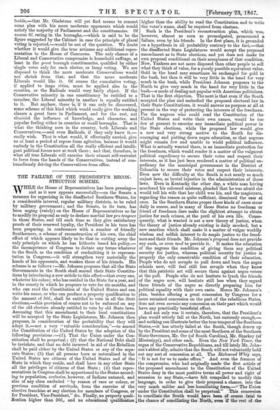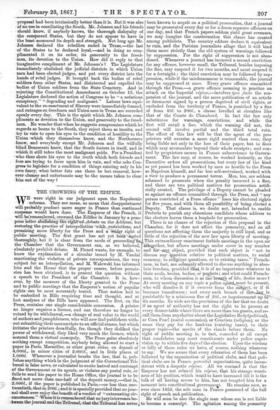THE FAILURE OF ThJi PRESIDENT'S RECON- STRUCTION SCHEME.
1WHILE the House of Representatives has been pressing— VT as it now appears successfully—on the Senate a measure for organizing in the disaffected Southern 4Btates, for a considerable interval, regular military districts, to be ruled by military government ; and the Senate, in its turn, has been urging (vainly) on the House of Representatives so far to modify its proposal as only to declare martial law pro tempore in those States, and till such time as they give satisfactory proofs of their renewed loyalty, the President in his turn has been preparing, in conferences with a number of friendly Southerners, a scheme of reconstruction of his own, the chief effect of which appears likely to be that in cutting away the Only principle on which he has hitherto based his policy,— the incompetence of Congress to dictate any terms whatever to the South as the condition of readmitting it to represen- tation in Congress,—it will strengthen very materially the hands of his opponents, and weaken those of his friends. His scheme is as follows :—Mr. Johnson proposes that all the State Governments in the South shall amend their State Constitu- tions by introducing a new article to this effect—that every one, whatever his colour, who has resided in the State for a year, and in the county in which he proposes to vote for six months, and who can read the Constitution of the United States and can write his name, or who can produce a property qualification to the amount of 50/., shall be entitled to vote in all the State elections,—this provision of course not to be enforced on any of the old electors already entitled to vote by old State laws. Assuming that this amendment to their local constitutions will be accepted by the Sfate Legislatures, Mr. Johnson then proposes, in consideration of the probability that they will adopt it,—not a very "valuable consideration,"—to amend the Constitution of the United States by the adoption of the following provisions :—(l). That the Union under the Con- stitution shall be perpetual ; (2) that the National Debt shall be inviolate, and that no debt incurred in aid of the Rebellion shall be paid either by the United States or any of the sepa- rate States ; (3) that all persons born or naturalized in the United States are citizens of the United States and of the State in which they reside, and shall have in any other State all the privileges of citizens of that State ; (4) that repre- sentatives in Congress shall be apportioned to the States accord- ing to population, exclusive, however, of Indians untaxed, and also of any class excluded "by reason of race or colour, or previous condition of servitude, from the exercise of the elective franchise at any election for members of Congress, or for President, Vice-President," ere. Finally, no property quali- fication higher than 50/., and no educational qualification higher than the ability to read the Constitution and to write the voter's name, shall be required from electors.
Such is the President's reconstruction plan, which was, however, almost as soon as promulgated, pronounced a failure, even by his friends. In the first place, it is grounded on a hypothesis in all probability contrary to the fazt,—that, the disaffected State Legislatures would accept the proposed amendment as to State elections, and yet does not make its own proposal conditional on their acceptance of that condition. Now, Yankees are not more disposed than other people to sell what they think of value, for a purely possible equivalent value. Gold in the hand may sometimes be exchanged for gold in the bush, but then it will be very little in the hand for very much in the bush, while President Johnson proposes to the North to give very much in the hand for very little in the bush—a mode of dealing not popular with American politicians. That is the first objection. The next is that even if the South accepted the plan and embodied the proposed electoral law in their State Constitutions, it would answer no purpose at all at present in the way of protecting the interests of the freedmen_ For the negroes who could read the Constitution of the- United States and write their own names, would be too- few at present to exercise any immediate political power in the State elections, while the proposed law would .-give a new and very strong motive to the South for dis- couraging and putting down negro education, so that negroes might remain few and unable to wield political influence.. What is actually wanted there, is an immediate protection for the freedmen, which would render it a matter of the vulgarest political expediency to secure their votes and respect their- interests, as it has just been rendered a matter of political ex- pediency for the municipal government in the District of Columbia to secure their votes and respect their interests.. Even now the difficulty at the South is not nearly so Much, unjust laws, as brutal injustice in the administration of those laws. Even in Kentucky the other day, a white man having murdered his coloured mistress, pleaded that he was afraid she- would tell his wife that her child was his, and the magistrate, regarding the reason as quite sufficient, dismissed the case at once. In the Southern States proper these kinds of cases occur daily in scores, and in many of those States no freedman or- friend of freedmen dare make the slightest attempt to obtain justice for such crimes, at the peril of his own life. Conse- quently, what is wanted is not a new theory of justice, when the theory of justice already existing is daily mocked, but a new sanction which shall make it a matter of vulgar worldly wisdom and selfish interest to do ample justice to the freed- men and their friends. Mr. Johnson's proposal does not provide. any such, or even tend to provide it. It makes the education of the negroes the condition of giving them any political security for justice, whereas political security for justice is- properly the only conceivable condition of their education. People who do not scruple to pull down and burn the negro schools now, will feel still less scruple when they know that this patriotic act will secure them against negro voters- at the poll. People who do not hesitate to lynch the friends ofthe negro now, will hesitate still less when they regard these friends of the negro as directly preparing him for' political equality with their own caste. Hence Mr. Johnson's plan, besides offering a great concession by Congress for a mere surmised concession on the part of the rebellious States, does not even surmise any concession on their part which would_ have any practically beneficial effect. And not only was it certain, therefore, that the President's plan would utterly fail at the North, but curiously enough,— and nothing can illustrate better the true temper of the Southern States,—it has utterly failed at the South, though drawn up. by the President and some of the most Southern of the Southern State Governors, Mr. Orr (of South Carolina), Mr. Sharkey (of Mississippi), and other such. Even the New York Times, the- organ of the Conservative Republicans, and till lately Mr. John- son's ablest ally, admits that the South will not voluntarily hold' out any sort of concession at all. The Richmond Whig says, "It is not for us to make offers." And even the framers of the compromise, who had originally made the first- article of the proposed amendment to the Constitution of the United States deny in the most positive terms all power and right of secession to any State,—have felt compelled to modify this- language, in order to give their proposal a chance, into the very much milder and less humiliating form,—" The Union under the Constitution shall be perpetual." This concession to conciliate the South would have been of course fatal to- nth° chance of conciliating the North, even if the rest of the proposal had been intrinsically better than it is. But it was also of no use in conciliating the South. Mr. Johnson and his friends should know, if anybody knows, the thorough disloyalty of the conquered States, but they do not appear to have in the least measured its depth and strength. Not long ago Mr. Johnson declared the rebellion ended in Texas,—the last of the States to be declared loyal,—and in doing so com- plimented it on its order, its generosity to the freed- men, its devotion to the Union. How did it reply to that imaginative compliment of Mr. Johnson's? The Legislature immediately abolished the judicial districts in which Union men had been elected judges, and put every district into the hands of rebel judges. It brought back the bodies of rebel soldiers from other States, and disinterred and expelled the bodies of Union soldiers from the State Cemetery. And in rejecting the Constitutional Amendment on October 13, the Legislature declared the action of Congress to be "a nefarious conspiracy," "degrading and malignant." Labour laws equi- valent to the re-enactment of Slavery were immediately framed, and outrages on freedmen and Union men in Texas are recorded openly every day. This is the spirit which Mr. Johnson com- pliments as devotion to the Union, and generosity to the freed- men. No wonder that when he suggests compromises which he regards as boom to the South, they reject them as insults, and try in vain to open -his eyes to the condition of hostility to the Union -which they themselves know, and the Northerners know, and everybody except Mr. Johnson and the wilfully blind Democrats know, that the South fosters in itself, and in which it still takes the most malignant pride. For a President who thus shuts his eyes to the truth which both friends and foes are trying to force upon him in -vain, and who asks Con- gress to legislate for a condition of things existing only in his own fancy, what better fate can there be but removal, how- ever clumsy and unfortunate may be the means taken to clear him.out of the way ?































 Previous page
Previous page